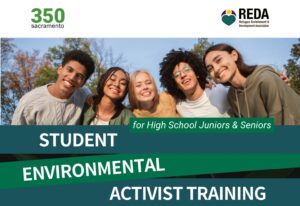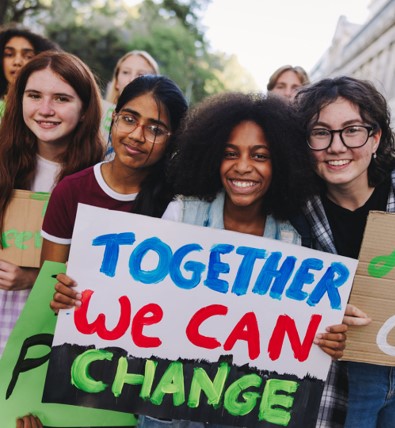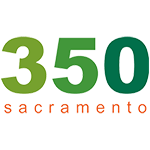
Student Environmental Activist Training (SEAT)
Protect the Planet • Build Leadership Skills • Make New Connections
Sacramento Area Students: Rising to the Climate Challenge
✅ High School Juniors & Seniors
The Student Environmental Activist Training (SEAT) is a free program open to students in the Sacramento area who want to learn how to be a leader in the fight against climate change. The upcoming session begins in August 2024 and is open for high school juniors and seniors.

Program Benefits
Protect the Planet
Learn how to make an impact in the environmental justice movement.
Build Leadership Skills
Add valuable skills and experience to your college & job applications.
Make New Friends
Meet other like-minded students and mentors in a safe space.
What is the SEAT program?

Offered since 2021, the SEAT program includes a combination of lessons, activities, guest speakers, and discussions, and is intended to prepare students to carry what they learn about environmental justice into their communities, schools, and future careers.
Program Goals
![]()
Goal #1
![]()
Goal #2
![]()
Goal #3
How does the SEAT program work?
The program includes a variety of presentations, lessons, discussions, and workshops. There are no homework assignments, no grades, and no fees. SEAT is meant to provide a positive learning experience where students gain knowledge, skills, experience, and confidence in environmental justice.
The Fall 2024 cohort will meet twice monthly, August through November, for a total of eight 2-hour sessions. Students can attend in-person or online.
Want to learn more?
To learn more about the Student Environmental Activist Training (SEAT) program, please fill out the interest form or contact the program director (Katie McCammon) at Katie.McCammon@350sacramento.org.
Our Partner Organizations
Refugee Enrichment & Development Association (REDA):
REDA's mission is to elevate and address the needs of the refugee and immigrant community in the Sacramento Area through culturally sensitive programs and critical services to help attain self-sufficiency, which will allow for better integration into the community at large. https://redacenter.org

GRID Alternatives:
GRID is a leading voice in low-income solar policy and the nation’s largest nonprofit solar installer, having trained over 44,000 participants in solar installation and serving families throughout California, Colorado, the Mid-Atlantic region, and tribal communities nationwide. https://gridalternatives.org/

Sunrise Movement Sacramento:
A youth-led group of environmental activists in association with the national Sunrise Movement. https://sites.google.com/view/sacsunrise/home

Fridays For Future Sacramento:
A group of young environmental activists founded in the spirit of the international Fridays For Future movement. https://fridaysforfuturesac.org/

Resources for Independent Living:
Promotes the socio-economic independence of persons with disabilities by providing peer-supported, consumer-directed independent living services and advocacy. https://www.ril-sacramento.org/

Social Justice PolitiCorps Sacramento:
Crowdsourcing politics, a collection of social justice advocates and organizations that track, report on, and mobilize around local government happenings. https://www.socialjusticesac.org/

Showing Up For Racial Justice Sacramento:
SURJ Sacramento mobilizes white people to show up in solidarity with Black, Indigenous, and People of Color-led movements in Sacramento in ways that are helpful to those movements. https://surjsacramento.org/